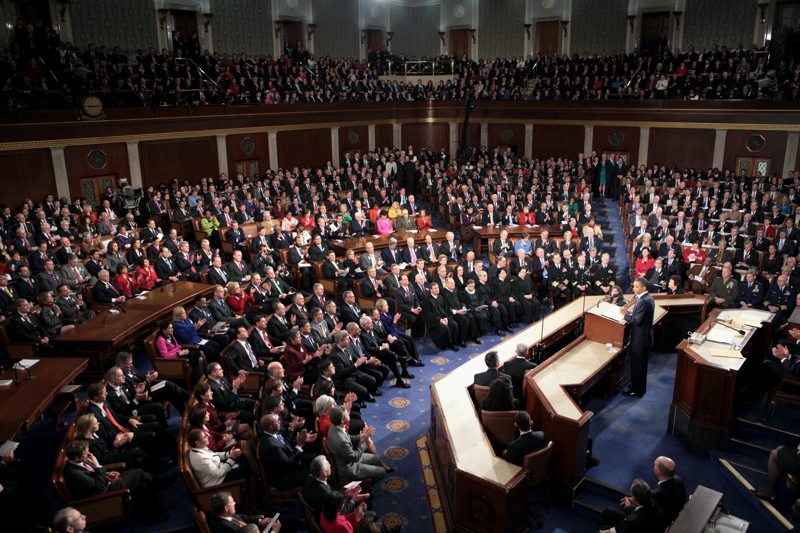Obama’s Opportunity
Posted on January 20, 2015

"2011 State of the Union" by Chuck Kennedy (Executive Office of the President of the United States) - http://www.whitehouse.gov/state-of-the-union-2011. Licensed under Public Domain via Wikimedia Commons.
(This originally appeared in The Hill.)
Ronald Reagan called on a Democratic Congress to give him a line-item veto and to pass a balanced-budget amendment to the Constitution in 1987. Bill Clinton, fresh after a failed effort to impeach him, called on the Republican Congress to lock the newly found budget surplus away in a Social Security lockbox. George W. Bush, in 2007, challenged the new Democratic Congress to balance the budget in five years.
It’s somewhat traditional for a second-term president to ask the Congress to do something he knows it won’t do in his second-to-last State of the Union.
So, it should come as no surprise that President Obama is going to ask the Republican-led Congress to enact a Robin Hood-inspired tax plan with a major goal to take from the rich and spread the wealth around a little to the poor and middle class.
He knows — and we know — it’s not going anywhere, like most of the rest of his plans as outlined in the speech later tonight.
They call the president a lame duck in his last two years for a reason. With time ticking down on his term in the White House and attention starting to turn to the race to be his replacement, the best a second-term president can hope for is to keep the trains running on time and to avoid impeachment.
It is par for the course to make the case that the State of the Union is strong and getting stronger. Reagan, Clinton and Bush all bragged about low unemployment and positive economic growth. Of course, all three would also leave their successors with economic messes to clean up (George H.W. Bush inherited a recession, George W. Bush had the dot.com bubble bursting on him and Obama got the financial crisis) — but that’s a different story.
In a commander in chief’s penultimate State of the Union address, the president will usually say a few words about Congress’s changing power dynamic. Ronald Reagan had warm words for Jim Wright, the new Democratic Speaker. Clinton mentioned Denny Hastert, who had just replaced Newt Gingrich. Bush opened his remarks talking about Nancy Pelosi’s historic rise to the Speaker’s chair. I wonder if Obama will even acknowledge the new Senate majority leader, Mitch McConnell.
Reagan, Clinton and Bush all faced a similarly hostile congressional audience that Obama will confront tonight. Reagan had to apologize for Iran-Contra, Clinton had just been acquitted by the Senate on House-passed impeachment charges, Bush was struggling with an increasingly unpopular war in Iraq.
But all three went out of their way to be accommodating to the new political reality. Sure, they had their pie-in-the-sky wish lists, but there was also an acknowledgment that both the Congress and the president had a shared responsibility to govern.
In his last State of the Union, Obama signaled that he had given up on working with Congress, that he was going to use his pen and his phone to get things done. I will be looking to see if he will in any way try to signal to the broader public tonight that he understands the new power dynamics in Washington.
The American people spoke in the last election, and they decided that they wanted both divided government and for the Congress and the president to work together.
That means that the president can’t and shouldn’t go it alone.
The president can have his pie-in-the-sky proposals, and I suppose the State of the Union is a fine place to unveil them. But back here on earth, Obama has a responsibility to find common ground with the new congressional majority.
Reagan did it. Clinton did it. Bush did it. In the last two years of their presidential terms, they found a way to work with hostile congressional majorities.
President Obama can do it too. And it all starts with his speech tonight.
